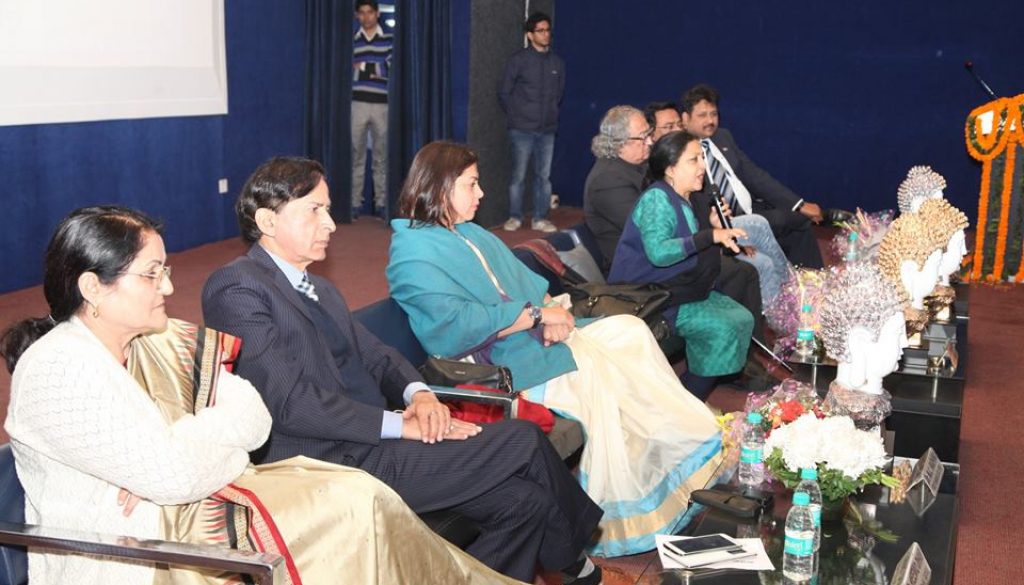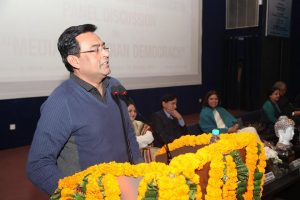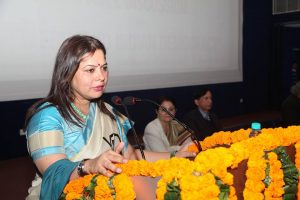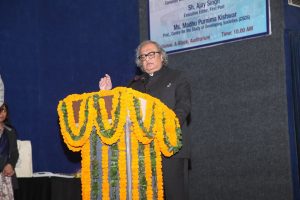Panel Discussion on ‘Media and Indian Democracy’
Faculty of Media Studies and Humanities of Manav Rachna International University organized a Panel Discussion on ‘Media and Indian Democracy’ to enlighten students about the all pervasive role of the media in democracy and the need to disseminate information with ethics and integrity!
January 16, 2017: The Department of Journalism and Mass Communication of the Faculty of Media Studies and Humanities of Manav Rachna International University organized a Panel Discussion on ‘Media and Indian Democracy’ at the campus here today. The Panel Discussion was a highly invigorating cerebral session attended by a host of dignitaries. The panelists were Ms. Meenakshi Lekhi, Member of Parliament; Sh. Tarek Fatah, Canadian writer, Broadcaster, Secularist and Activist; Ms Madhu Purnima Kishwar, Professor of Indian Council of Sciences & Social Research; Sh. Shams Tahir Khan, Channel Head, Aaj Tak New Delhi.
The discussion provided a vibrant platform to discuss ‘Media and Indian Democracy’ in shaping human minds and public opinion. Media nowadays is all pervasive and it has encompassed all aspects of society, governance and human life. The objective behind this discussion was to give media students an exposure to the ground realities of the profession through experience sharing with journalists, politicians and writers of repute. The panel discussion gave students an understanding of media’s role in shaping the ‘art’ and ‘act’ of democracy.
Speaking on the occasion, Ms Madhu Purnima Kishwar, said, “There is very little investment on research and libraries in the media. In my opinion, the media can only be called the Fourth Pillar if it is a watchdog and is given adequate freedom in the Indian democracy. While in the journalistic profession, it is important to exercise accuracy in the use of words and expressions besides maintaining ethics and integrity!”
As one of the key panelists at the session, Ms Meenakshi Lekhi advised the students, saying, “Watch news and analyze news. The media in a democracy is a messenger to carry the voices and messages of the people. Media professionals should perpetuate the truth with unbiased reporting; there should be narratives and counter narratives along with open disclosures.” Further addressing the students, Ms Lekhi said that they should devote themselves towards nation building.
In an impassioned speech, Sh. Tarek Fatah, greatly energized students stating, “There is no profession in the world which cannot be critiqued by another profession. Having said that, as journalists you need to understand your true role in society– Journalism as a profession came with the need for personal liberty. Indian journalists have a tough job to do because Journalism here is driven by class, caste and colour. As Journalists, we speak our voice and our job is to report not to change society. However, Indian Journalism is far ahead as compared to many countries in the world.”
Sh. Shams Tahir Khan spoke about the Crime beat in the electronic media—an unconventional field– and the fact that students of Journalism can be optimistic about the future despite the fact reporting has dwindled only to be replaced by anchoring.
Also present on the occasion were Dr Sanjay Srivastava, MD, MREI; Dr N.C. Wadhwa, VC, MRIU, Dr Neemo Dhar, Dean, FMeH, MRIU who delivered the welcome address.







